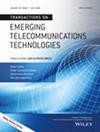Enhancing Deep Learning-Based Channel Estimation: A Novel Autoencoder-Based Approach
Abstract
Deep-learning (DL) methods have shown promising performance in pioneering studies on orthogonal frequency division multiplexing (OFDM) channel estimation challenges. Unlike typical DL-based channel estimation methods that mainly rely on separate real and imaginary inputs while ignoring the inherent correlation between the two streams, this paper proposes AE-DENet, a novel autoencoder (AE)-based data enhancement network to achieve robust channel estimation for OFDM systems. AE-DENet employs the classic least square (LS) channel estimation as input and proposes a data enhancement method to extract the interaction features from the real and imaginary parts of the complex channel estimation matrix, which are joined with the original real and imaginary streams to generate an enhanced input for better channel inference. Experimental findings in terms of the mean square error (MSE) results for a range of representative DL-based channel estimation methods demonstrate that the proposed AE-DENet-enhanced channel estimation framework achieves state-of-the-art channel estimation performance with trivial added computational complexity. Furthermore, the input dimensions of the DL-based channel estimation models can be adaptively adjusted to accommodate the dimension of the enhanced LS input. The proposed approach is also shown to be robust to channel variations and high user mobility.

 求助内容:
求助内容: 应助结果提醒方式:
应助结果提醒方式:


